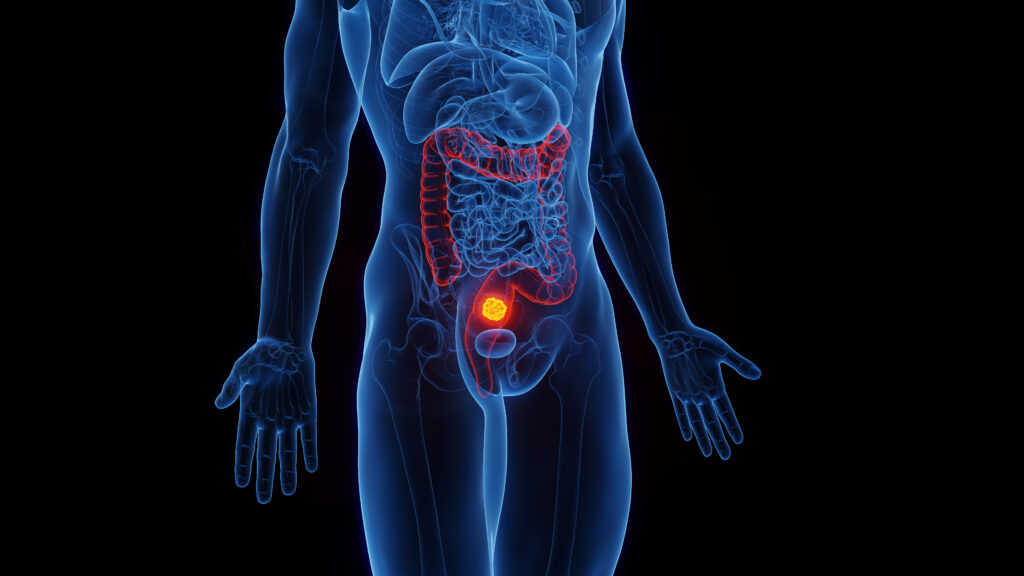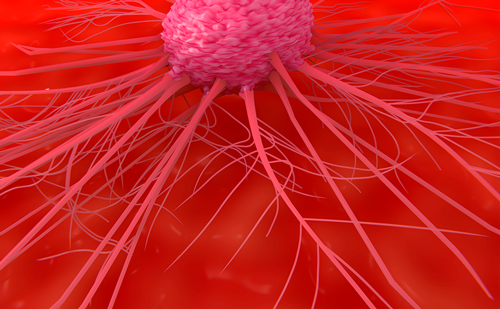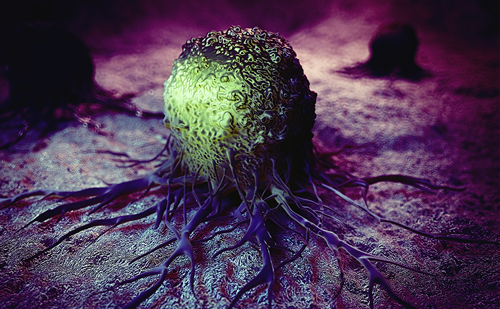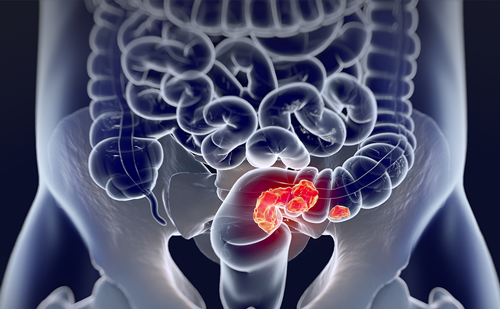Gastrointestinal stromal tumors (GISTs) are the most common mesenchymal malignancy in the gastrointestinal tract. These sarcomas often originate in the stomach or small intestine, but have also been found to affect extraintestinal sites such as the mesentery and omentum. Since discovering that these tumors express the cell surface growth factor receptor KIT,1 greater understanding of GIST pathophysiology has revolutionized the therapeutic approach to treating these tumors. The ability to diagnose these tumors has been greatly improved because approximately 85% of GISTs stain positive for the CD117 antigen, an epitope for the KIT receptor tyrosine kinase.1,2 A smaller percentage of patients have mutations in the platelet-derived growth factor receptor alpha (PDGFRA) gene (5–7%) or have no detectable kinase mutations (10%).1,2
Gain-of-function mutations in the c-kit proto-oncogene result in constitutive activation of the KIT receptor tyrosine kinase, and are largely responsible for the pathogenesis of GISTs. Historically, the medical management of these tumors had limited efficacy. Surgery was the mainstay of therapy due to the high resistance of the tumors to chemotherapy and radiation. Tumor recurrence was frequently observed following complete surgical resection of primary localized GIST, with five-year survival rates of 50%.3 Prognosis was grim for the estimated one-third of patients who presented with unresectable or metastatic disease at diagnosis; with surgical intervention alone, median survival for those patients with metastatic or recurrent GISTs ranged between six and 18 months.3,4
The introduction of the tyrosine kinase inhibitor (TKI) imatinib mesylate has had a major impact on the treatment and outlook for patients with GISTs. As a competitive antagonist of the adenosine triphosphate (ATP) binding site, imatinib effectively inhibits the KIT and PDGFRA kinases by interrupting the downstream signaling cascade that leads to cell proliferation.5 Up to 85% of patients with advanced disease who are treated with imatinib have long-term disease stabilization and partial responses, with < 10% achieving complete responses. Notably, the twoyear survival of patients with advanced disease has risen to 75–80% following imatinib treatment.6–8 Imatinib is currently the standard of care for patients with advanced GIST, a disease previously thought of as untreatable. Based on newly available long-term data with imatinib, the US Food and Drug Administration (FDA) recently converted its prior accelerated approval of imatinib to full (regular) approval for the treatment of patients with KIT/CD117-positive unresectable and/or metastatic malignant GISTs.
Improved Outcomes for Patients with Advanced Disease
Early studies with imatinib in advanced GIST provided promising data. A phase II study by Demetri et al. randomized 147 patients with unresectable or metastatic GIST to receive 400 or 600mg/day of imatinib. Patients who progressed on 400mg/day had their dose increased to 600mg/day.6After a median follow-up of 21 months, partial response and stable disease were achieved in 66 and 17% of the total patient population, respectively.9Progressive disease led to death in 14% of patients. Although median survival was not reached, researchers estimated 85% to be alive at 19 months. One-third of patients who progressed on the lower dose sustained a partial response upon cross-over. Similar results were reported by a phase II study testing the efficacy of imatinib at the dose of 400mg twice daily in 27 patients with histologically proven advanced and/or metastatic GIST characterized by KIT expression.10 Of these patients, 89% experienced some degree of symptomatic improvement: 4% had complete remission, 67% partial remission, and 18% stable disease, while 11% had progressive disease. Clinical trials have reported a median time to objective response ranging from 13 to 16 weeks for patients with advanced GIST treated with imatinib,6,9 although some patients have shown dramatic symptomatic improvement within days, along with evidence of reduced metabolic activity on positron emission tomography (PET) scans. Biopsy specimens from a patient with metastatic GIST have also shown a marked decrease in tumor cells, myxoid degeneration, and scarring within one month.11 These tumor cells did not stain for the proliferation marker Ki-67, suggesting an absence of active cell division.Long-term efficacy data on treatment with imatinib in patients with advanced disease have since been made available. Two large, randomized, controlled phase III trials compared the effects of 400mg/day imatinib with 800mg/day imatinib (400mg twice daily). In both studies, patients were allowed to cross over from the low-dose arm to the high-dose arm at disease progression. In the study led by the European Organization for Research and Treatment of Cancer (EORTC), which included the Australasian Gastro-Intestinal Trials Group and the Italian Sarcoma Group, 946 patients with advanced GIST were randomized to the two study arms to evaluate the primary end-point of progression-free survival (PFS).8 After a median follow-up of 25 months, objective response rates (ORRs) were simila between treatment arms: 50% for the low-dose group and 54% for the highdose group. A median follow-up of 40 months allowed for an analysis of overall survival (OS), and found no significant difference in OS between the two arms.12 Furthermore, the previously reported advantage for PFS for 800mg/day at 25-month follow-up8 was no longer statistically significant at this 40-month follow-up.12 The other phase III study, led by the Southwest Oncology Group (SWOG), included the Cancer and Leukemia Group B, the Eastern Cooperative Oncology Group, and the National Cancer Institute of Canada, and randomized 746 patients to evaluate the primary end-point of OS.13 Early interim results after a median follow-up of 14 months showed no difference between the dosage groups in PFS or OS and a similar proportion of patients achieving an objective response (43% for 400mg/day versus 41% for 800mg/ day) or stable disease (32% for both groups). At a median follow-up of 25 months, two-year survival was 74 and 78% for the 400 and 800mg treatment arms, respectively, while the two-year PFS was 50 and 53%, respectively.14 Of the 88 patients who progressed and crossed over to the higher dose, 3% exhibited partial response and 28% achieved stable disease. After a median follow-up of 4.5 years, there were no statistically significant differences in ORR (45% for both doses), PFS (18 months for 400mg versus 20 months for 800mg), or OS (55 months for 400mg versus 51 months for 800mg).13
Neither of these two large studies found any major clinical benefits with initiation of higher-dose imatinib, with no apparent improvement in response rates or rates of disease stabilization. Furthermore, increased initial imatinib dosage conferred no apparent advantage in terms of OS. These two study groups with intentionally similar designs agreed to a prospectively defined combined analysis of the studies. The primary end-points of this ‘metaGIST’ project were PFS and OS. At a median follow-up of 45 months, the investigators found a small but significant advantage in terms of PFS with high-dose imatinib, but no advantage in OS.15 Heterogeneity between the two studies is currently under investigation.
Optimizing Imatinib Dosing—Less May Be More
The EORTC and SWOG studies saw a confirmation of clinical activity at both the standard dose and the higher dose of imatinib, where imatinib was well-tolerated overall. However, the higher dose of 800mg/day was associated with more dose reductions than the dose of 400mg/day in both studies (EORTC: 60 versus 16%; SWOG: 44 versus 10%).8,16 Furthermore, severe toxicities were more common in patients treated with 800mg/day than in those treated with 400mg/day (EORTC: 50 versus 32%; SWOG: 63 versus 43%).8,13 The cross-over design of the studies showed that increasing the dosage for patients who progress on the standard dose of imatinib is feasible, with approximately one-third of patients experiencing clinical benefits—typically disease stabilization, although a minority do achieve partial responses. Data from EORTC at a median follow-up of 25 months showed that of the 133 patients who crossed over, three (2%) had a partial response and 36 (27%) achieved stable disease for a median duration of 153 days.17 Similarly, three of the 117 assessable patients (3%) in SWOG had partial response following cross-over, and 33 (28%) had stable disease.13 Median and one-year PFS following cross-over in EORTC were 81 days and 18%, respectively.14,17 In SWOG, median PFS was five months after cross-over, with a median OS of 19 months.13 The incidence of dose reductions in cross-over patients was lower than that observed in the treatment group assigned to receive high-dose imatinib: 17 and 16% of patients in EORTC and SWOG, respectively, had a dose reduction following cross-over, suggesting that patients who escalate their dose from the initial 400mg/day appear to be better able to tolerate high doses. The severity of toxicities did not differ significantly before and after cross-over, except for worsening of anemia and fatigue and possible improvement in the severity of neutropenia.17
When analyzed separately, the outcomes of the individual EORTC and SWOG studies suggest that the higher dose of 800mg/ day is more toxic but not more effective than 400mg/day. However, approximately one-third of patients do benefit from a dose increase upon disease progression. Furthermore, a separate study compared a dose of 400mg/day with 600mg/day, although it was not powered to distinguish between the efficacies of the two doses and PFS data were not reported.6 Although no significant difference was found between the doses, one-third of patients (three of nine) crossing over to the high dose at disease progression sustained partial response or stable disease. Results from a small clinical study (n=24) comparing the 600 and 800mg/day dose levels in patients with metastatic/ unresectable GIST following progression at the standard 400mg/day dose have recently been published.18 Similar to earlier results, approximately one-third of patients who progressed on the standard dose achieved clinical benefit upon dose increase to 600 or 800mg/ day. The FDA recently approved amendments to the prescribing information in which a dose increase up to 800mg daily, given as 400mg twice daily, may be considered in patients with advanced GIST who exhibit symptoms of disease progression at the lower dose. In addition, sunitinib malate, an inhibitor of vascular endothelial growth factor receptors (VEGFRs) in addition to KIT and PDGFRA, has demonstrated efficacy in patients who experience progression on or are intolerant to imatinib.19 The EORTC study also reported KIT mutational status to have an impact on the response rates to different imatinib doses.20 Initial treatment with imatinib 800mg/day resulted in significantly better PFS than 400mg/ day in patients harboring KIT exon 9 mutations (p=0.0013), although no correlation could be drawn between PFS and initial imatinib dose in patients with KIT exon 11 mutations (p=0.25) or no detectable KIT or PDGFRA mutations (p=0.07). Therefore, for patients with KIT exon 9 mutations, initial treatment with 800mg/day imatinib should be considered. Although this benefit of initial therapy with 800mg/day imatinib could not be confirmed by the SWOG study, it did document a significant PFS advantage for the 800mg starting dose over the 400mg/day dose for the total of 91 patients in the KIT exon 9-mutated subgroup (p=0.02) and in the pooled data set for all patients (p=0.04).15,21
The current consensus is that the conventional starting dose of 400mg/day imatinib as the standard of care in treating advanced GIST is sufficient. While higher doses of imatinib have been evaluated, there is a need for further well-designed trials to evaluate the efficacy of these doses. It is necessary to find a balance where greater efficacy does not come at the cost of an increase in adverse effects— possibly trials in which patients receive stepwise dose escalations from the starting dose of 400mg daily. Neoadjuvant Imatinib in Unresectable/ Metastatic Gastrointestinal Stromal Tumors
The traditional role of surgery for patients with advanced unresectable or metastatic GISTs was palliative, where tumor debulking was beneficial only for reducing the degree of symptomatic complications or pain. The changes in the management of advanced GIST brought on by the introduction of TKIs have led to a re-evaluation of the role of surgical resection. The efficacy of imatinib in controlling locally advanced and metastatic GIST has prompted studies into the use of the drug in a neoadjuvant setting. One case study has reported that after six months of imatinib treatment a patient with a previously unresectable GIST exhibited metabolic response and a significant reduction in tumor size that made the tumor eligible for surgical resection.22 A number of studies have shown that pre operative imatinib can decrease tumor volume and increase the rate of complete surgical resection in patients with unresectable primary, recurrent, or metastatic GISTs, thereby conferring prolonged survival.23–29 Surgical outcome following TKI treatment has been shown to correlate strongly to the disease state at the time of surgery; patients who experienced partial responses to imatinib were far more likely to undergo complete resection (>72%) and have prolonged disease-free survival, but initial responders to imatinib who proceeded to progress before resection rarely had complete resection (<26%). These results suggest that there may be an optimal time at which to proceed with surgical resection: even though continued tumor shrinkage can occur after one year of imatinib therapy, the median time to best response has been estimated to be 3.5 months, with minimal further decrease in tumor load after nine months.8 Patients with advanced GISTs who show evidence of partial response with imatinib should be evaluated for resection as early as possible, and select patients with progressive lesions can also benefit from surgery. Continuation of post-operative imatinib therapy has also been shown to be crucial. Interruption of therapy leads to rapid disease progression in the majority of patients with advanced GIST, even if complete resection was previously achieved.24,30 Current data suggest an early aggressive surgical approach for all patients with advanced GIST, but further prospective trials are necessary in order to define the long-term effects of neoadjuvant imatinib on PFS and OS in unresectable/metastatic GIST and the optimum time at which to implement surgical intervention.
Predictive Factors for Clinical Response
No correlation has been found between clinical response to imatinib and any histological or immunohistochemical parameters.31 Moreover, patients with KIT-undetectable GISTs have demonstrated comparable response rates to patients with KIT-positive tumors in the setting of advanced disease,32,33 which suggests not only that imatinib can provide clinical benefit for patients with KIT undetectable GISTs, but also that there is a need for improved, correct, pathological diagnoses.
Research into the mutational status of c-kit has shown the most promise in predicting response rates thus far. The gain-of-function mutations occur most frequently in exon 11, while those in exons 8, 9, 13, and 17 are less common.21,33 Studies in patients with advanced GISTs have shown that the clinical response to imatinib varies depending on the causative mutation. Patients with tumors containing exon 11 KIT mutations have improved treatment outcomes relative to those with exon 9, wild-type, or undetectable kinase mutations: not only are they more likely to achieve a clinical response, they also benefit from a longer PFS and OS.2,21,34 In contrast, greater clinical response has been seen in patients with exon 9 mutations than those with exon 11 mutations under sunitinib therapy after failure or intolerance to imatinib.35 As previously discussed, there also appears to be a dose-dependent effect, where patients with exon 9 mutations receiving 800mg/day imatinib have significantly improved response rates compared with those receiving 400mg/day, while those with exon 11 mutations do not experience any dose-dependent effect.15,20,21 Mutational analysis may be utilized to predict which patients have the best chance of responding to imatinib 800mg/day. Patients with KIT exon 11 mutations being treated with the higher imatinib dose should be closely monitored, with treatment switching to next generation TKIs considered in those who experience disease progression.
Summary
The introduction of imatinib has drastically improved the outcome of patients with GISTs, especially those with advanced disease. Recent long-term data have shown that many patients who progress on the conventional dose of imatinib are still able to achieve controllable disease by increasing the dose. Neoadjuvant therapy has also been shown to be safe and beneficial as a palliative treatment. Many questions still remain as to how imatinib therapy with GIST can be further improved and optimized—whether by dosing, early aggressive therapy, isolating factors that can predict clinical outcome, or individualized therapy based on mutational analysis. ■













